Notion 3.0 AI Review: Are Notion’s AI Agents Worth It?
Businesses today are eager to adopt AI agents – projections show the global AI agents market reaching $7.6 billion in 2025, a significant increase from $5.4 billion in 2024. This surge in popularity is driven by the promise of enhanced productivity and streamlined workflows.
Notion, a popular all-in-one workspace, has embraced this trend, culminating in the recent launch of Notion 3.0 and its new AI agents. This move marks a significant pivot for the company, placing AI at the core of its product offering.
What is Notion 3.0 AI?
Notion 3.0 is the latest iteration of the popular productivity app, with AI agents at its heart. These agents are designed to automate tasks, manage information, and act as a personalized assistant within the Notion ecosystem.
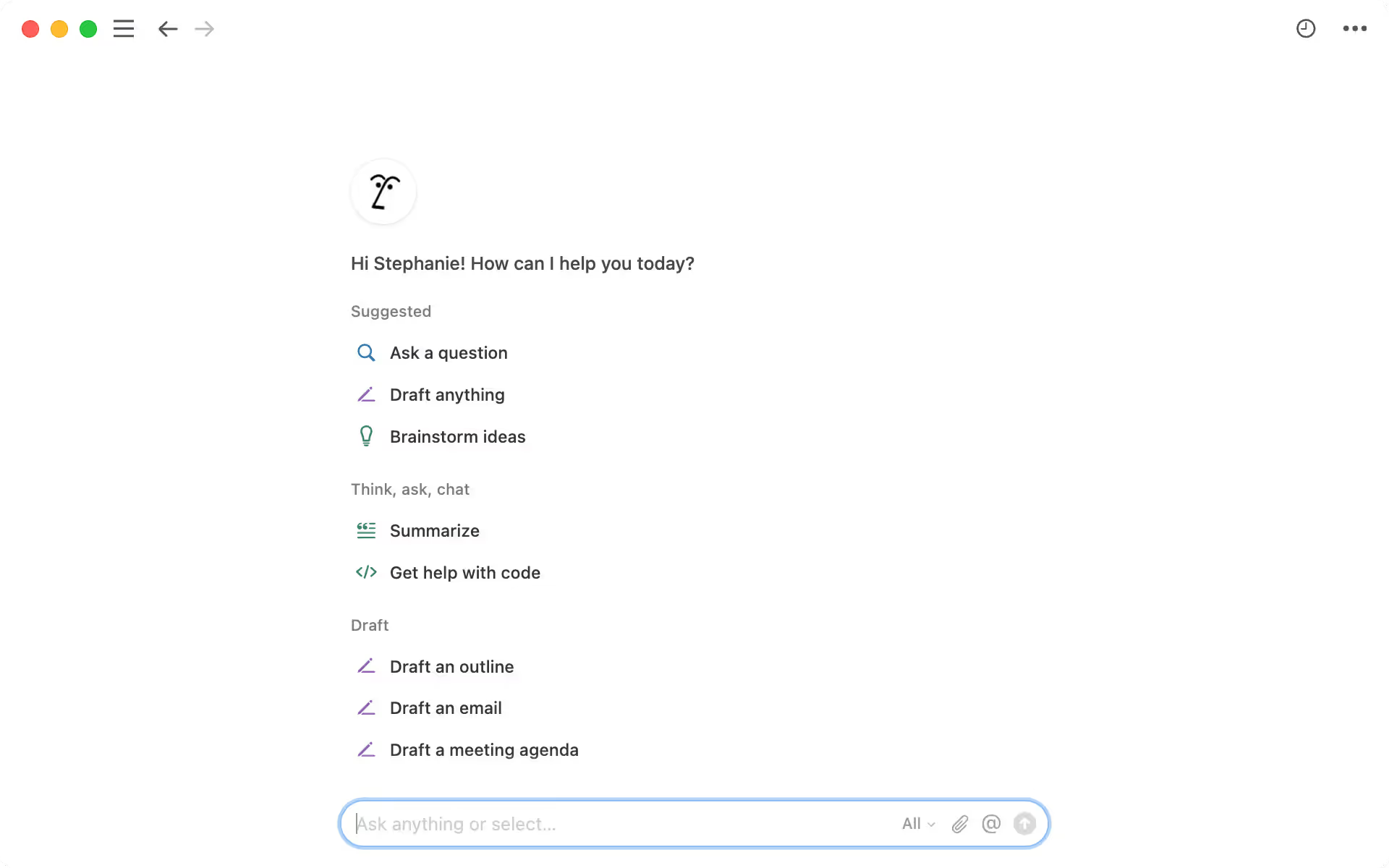
What are AI agents?
At their core, AI agents are autonomous systems that can perceive their environment, process information, and take actions to achieve specific goals.
In the context of a workspace like Notion, they act as intelligent assistants that can understand user requests, interact with the platform's features, and perform tasks without direct human intervention.
Notion’s new AI agents explained
Notion's AI agents are designed to function as an extension of the user, capable of performing any action a human can within the Notion workspace.
This includes creating documents, building databases, searching across connected tools, and executing multi-step workflows. The goal is to offload repetitive and time-consuming tasks, freeing up users to focus on more strategic work.
Explore AI agents in our whitepaper.
Notion 3.0 Features: What Can The New AI Agents Do?
Notion 3.0's AI agents introduce a range of new AI assistant features aimed at enhancing productivity and personalization. The focus is on creating a deeply integrated and context-aware AI that understands your entire knowledge base.
Cross-platform knowledge work
The AI agents can search for and synthesize information not just within your Notion pages and databases, but also across your team's other essential tools like Slack, Google Drive, and Figma.
For example, you could ask your Notion AI agent to "summarize the key decisions from yesterday's product discussion on Slack and find the latest mockups in Figma for Project X."
The agent would then retrieve and consolidate this information into a single, coherent document, saving significant time and eliminating the need to manually switch between apps.
Granular personalization
Notion is moving beyond generic AI responses with deep, granular personalization. Users can actively train their AI agents by providing them with specific context about their team, projects, and company-specific terminology.
You can feed the AI your company's mission statement, style guides, project roadmaps, and meeting notes. This creates a highly customized assistant that understands your unique work environment.
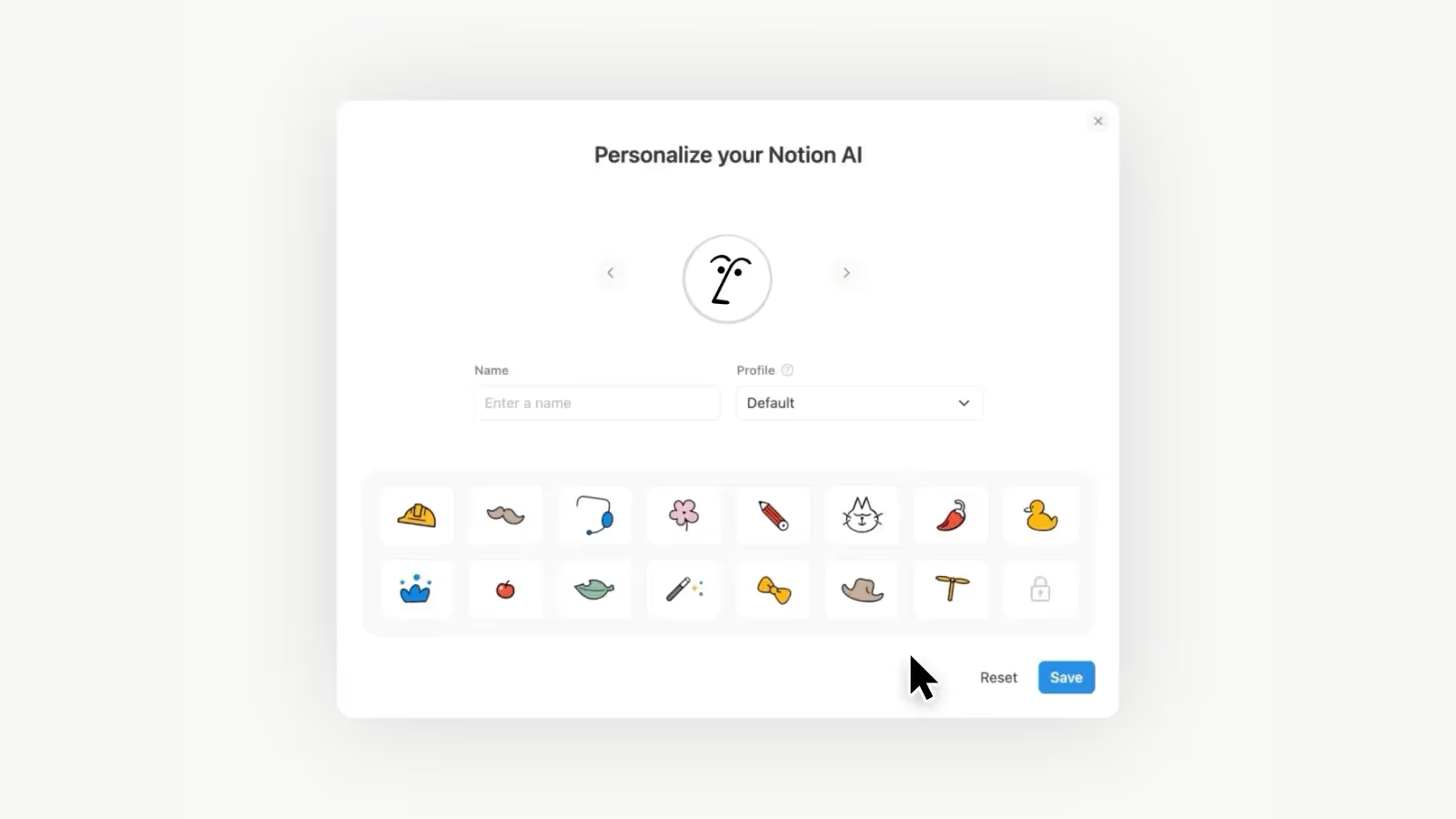
When you ask it to draft a project proposal, it will use the correct tone, reference the right team members, and align with your company's strategic goals, providing outputs that are far more relevant and immediately usable.
Trigger-based custom agents (upcoming)
Perhaps the most forward-looking feature is the planned rollout of trigger-based custom agents. This will allow users to build a "team" of specialized AI assistants designed to automate complex, multi-step workflows without needing to write any code.
For instance, you could create an "Onboarding Agent" that triggers whenever a new employee is added to a database. This agent could then automatically generate a personalized onboarding plan, create introductory tasks, and send welcome messages via a connected Slack channel.
Another agent could manage bug reports, automatically categorizing them based on keywords and assigning them to the relevant engineer. This feature promises to bring a new level of sophisticated, customized automation to the platform.
Notion AI connectors
Underpinning the cross-platform capabilities are the new Notion AI connectors. These are robust integrations that allow Notion's AI to securely access and interact with data in other applications.
The initial rollout includes connectors for widely used tools like Slack and Google Drive, with plans to expand to others like Asana and Jira.
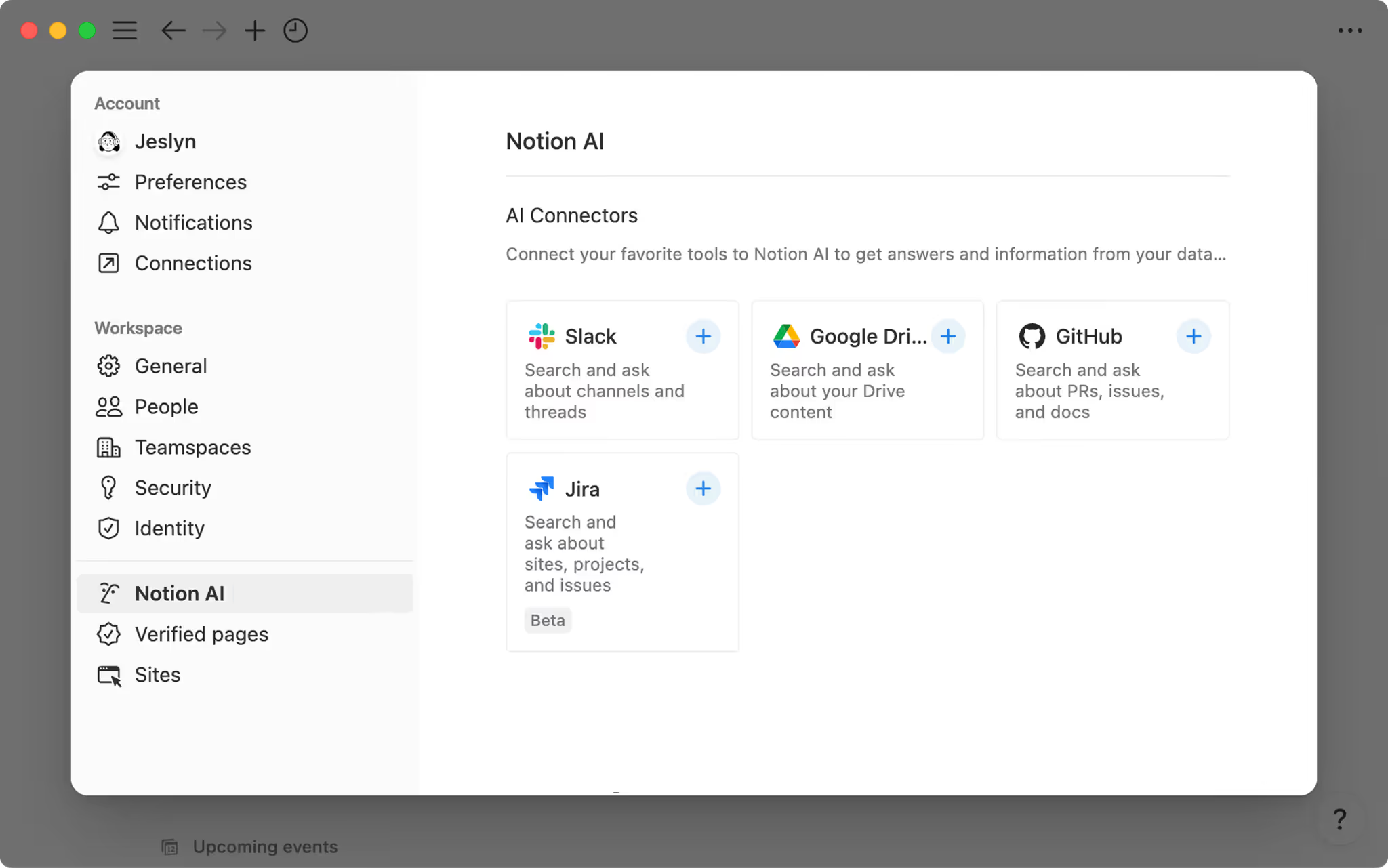
These are not just simple data importers; they allow the AI to understand the context of the information within those platforms. This deep integration is what enables the AI to fulfill complex requests that span multiple services, effectively making Notion the central hub for your entire knowledge ecosystem.
Claude Sonnet 4 and GPT-5 built-in
To power these advanced features, Notion 3.0 has integrated state-of-the-art Large Language Models (LLMs), including Anthropic’s Claude Sonnet 4 and OpenAI’s GPT-5.
By building in access to multiple leading models, Notion gives users the flexibility to leverage the best technology for any given task. One model might excel at creative brainstorming and writing, while another is better suited for logical reasoning and data analysis.
This multi-model approach ensures users have access to cutting-edge AI capabilities directly within their workspace, without needing to manage separate subscriptions or switch between different AI tools.
How Much Does Notion 3.0 Cost? Notion AI Agents Pricing
Notion has shifted its AI pricing model, moving away from an add-on subscription to integrating AI features directly into its core subscription tiers. This simplifies the offering but makes the higher-tier plans essential for teams wanting to leverage the full power of Notion's AI.
Here is a breakdown of how AI is included in each plan:
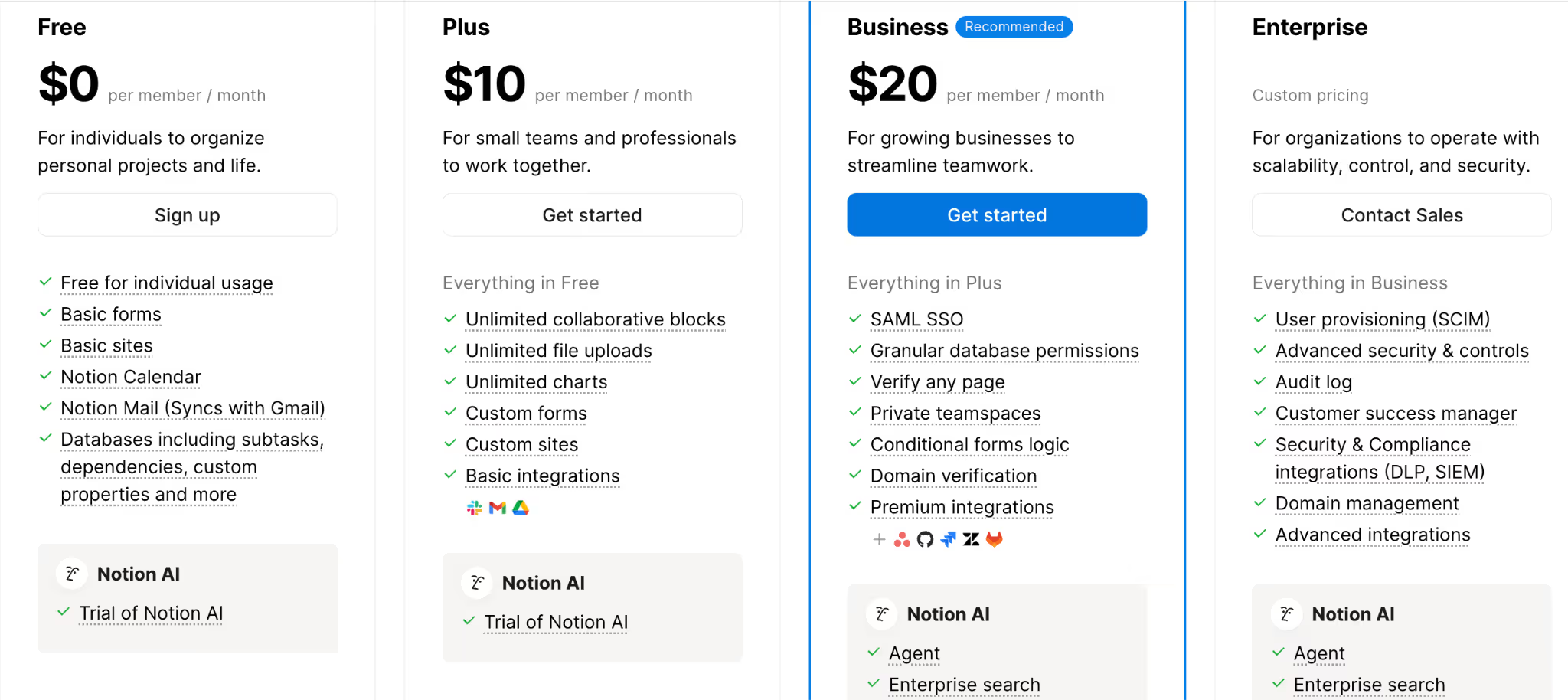
Free & Plus Plans
Users on the Free and Plus ($10 per user/month) plans have access to a limited, one-time trial of the new AI features. This trial includes a total of 20 AI responses for the entire workspace. Once these responses are used, the AI capabilities will be locked. This is designed to give users a taste of the AI's potential but is not sufficient for regular, ongoing use.
Business Plan
The full suite of Notion 3.0 AI features, including unlimited AI usage, cross-app connectors, and personalization, is included in the Business Plan.
This plan is priced at $20 per user per month when billed annually (totaling $240 per user per year) or $24 per user per month when billed monthly.
For teams, this represents a significant investment, effectively doubling the cost of the Plus plan. The value proposition here is that the AI is not a separate tool but a deeply integrated part of the workspace, potentially justifying the cost by replacing other standalone AI subscriptions and increasing productivity within Notion.
Read our complete guide to AI assistant pricing.
Enterprise Plan
For larger organizations with advanced needs, the Enterprise Plan includes all the AI features of the Business Plan, plus additional benefits like SAML SSO, advanced security controls, a dedicated customer success manager, and custom contracting. Pricing for the Enterprise plan is available upon request and is tailored to the organization's specific size and requirements.
For many teams, the decision will come down to a cost-benefit analysis. A solo user or small team might find the Business Plan's price comparable to subscribing to an all-purpose tool like ChatGPT Plus.
What Are Customers Saying About Notion 3.0 AI?
As a recent release, customer feedback on Notion 3.0 AI is still emerging, but early reviews are mixed. On platforms like Reddit, some long-time Notion users have praised the AI as a "game-changer," highlighting the ability to query their entire workspace and the usefulness of AI-powered search and meeting notes.

Others, however, have expressed frustration with the cost, especially for those who already subscribe to other AI services like ChatGPT Plus.
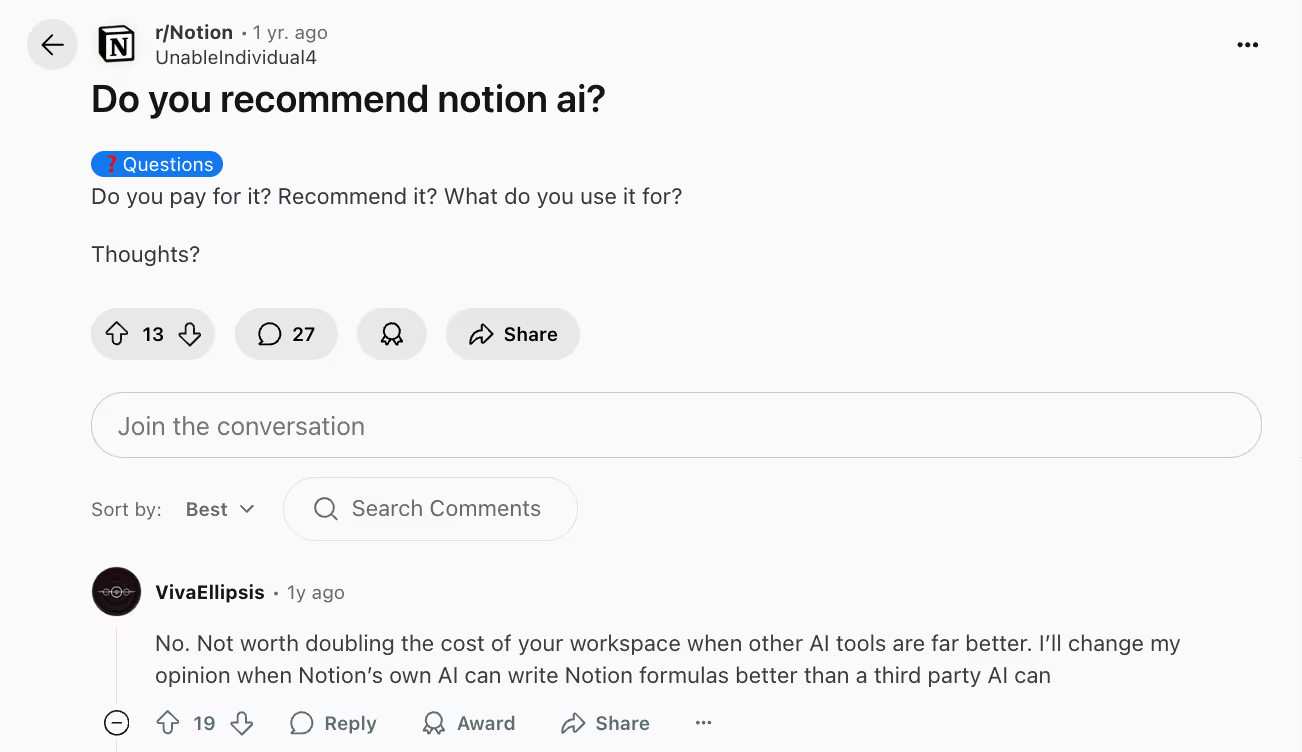
Some users have also reported a desire for more robust database integration and the option for a monthly trial to test the AI's capabilities more thoroughly.
Notion AI Alternatives
For those seeking AI-powered productivity solutions, several alternatives to Notion AI are available.
ClickUp Brain

ClickUp Brain is an AI-powered assistant integrated into the ClickUp platform. It offers features like AI-powered task management, content creation, and meeting summarization. It can also connect to various external applications to provide a more unified workflow.
Monday.com AI
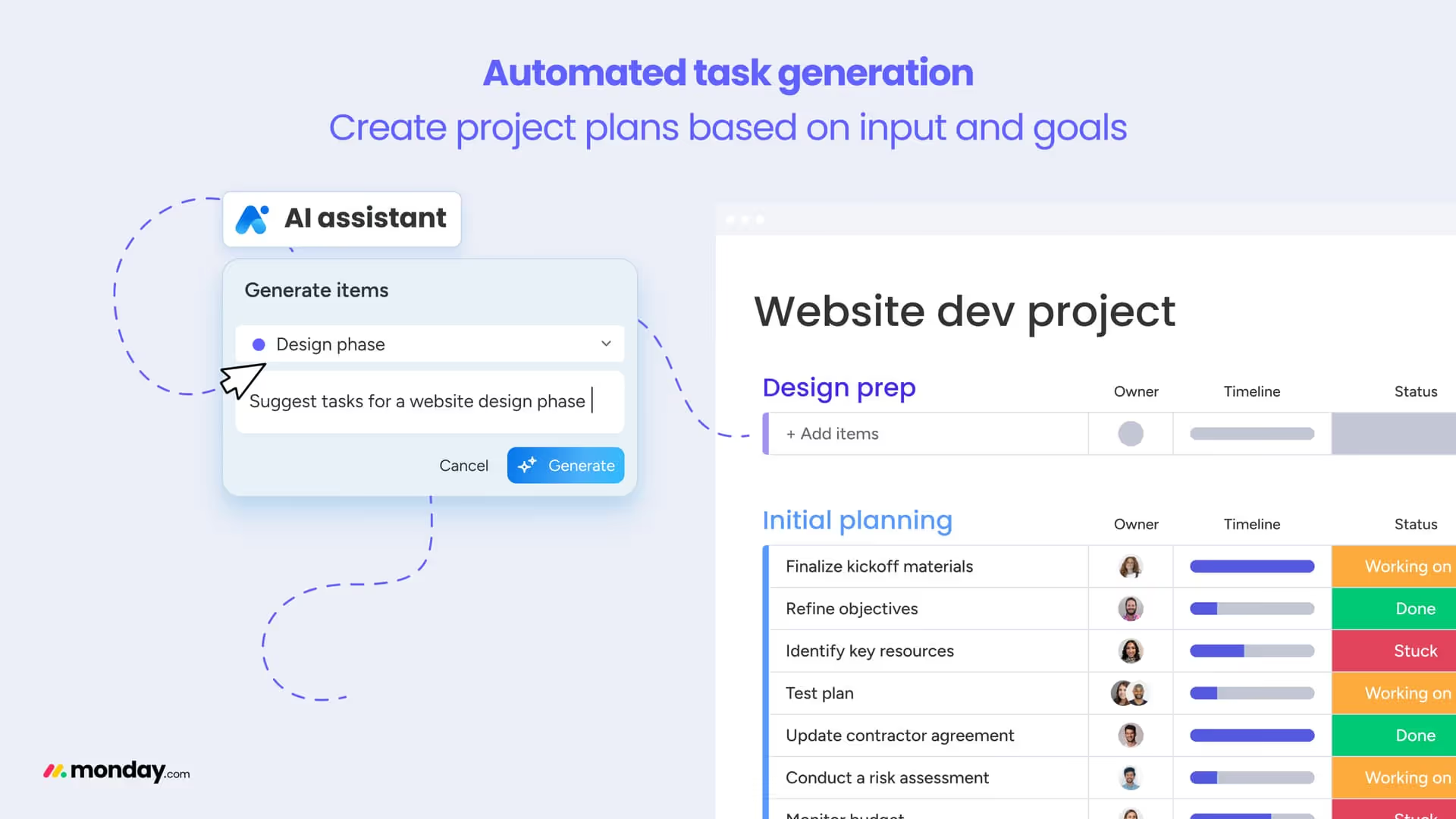
Monday.com's AI offering includes features like AI-powered workflow automation, task prioritization, and sentiment analysis. It aims to streamline project management and improve team collaboration by automating repetitive tasks and providing intelligent insights.
Other Options for AI Assistants
Beyond project management-focused solutions, other AI assistants can help with specific tasks and workflows.
Gmelius
For teams whose work revolves around communication, particularly email, Gmelius offers a specialized set of AI agents that live directly within Gmail.
Unlike Notion's focus on knowledge management, Gmelius targets the high-volume, fast-paced environment of shared inboxes for teams in sales, customer support, and operations.
How Gmelius AI Agents Reduce Email Workload and Support Teamwork
Gmelius transforms a standard Gmail inbox into a collaborative workspace with a team of AI agents designed to automate the most time-consuming aspects of email management.
AI Reply Assistant
This agent goes beyond simple templates. It analyzes the context of an entire email thread and generates ready-to-send responses in a single click. The AI can be trained on a company's knowledge base and past correspondence to ensure replies are accurate, personalized, and consistent with the brand's tone of voice.
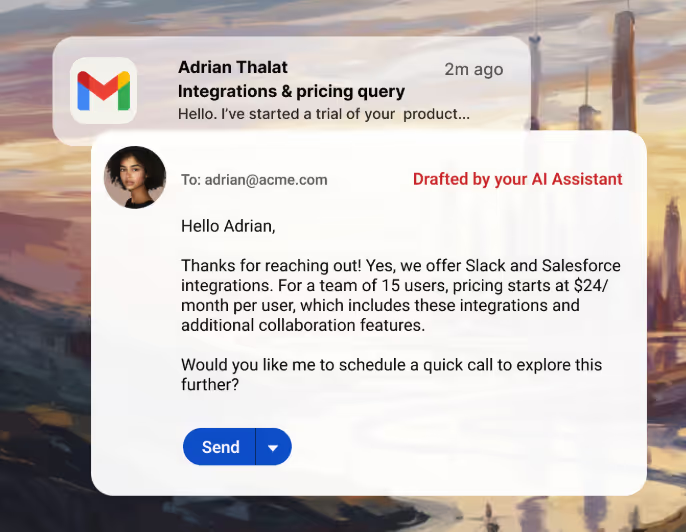
AI Sorting Assistant
This agent acts as an intelligent front desk for your inbox. It automatically reads, understands, and categorizes incoming messages by applying relevant tags like "Sales Inquiry," "Technical Support," "Invoice," or "Urgent." This allows teams to instantly prioritize their workload and focus on what matters most, without manually sifting through a crowded inbox.
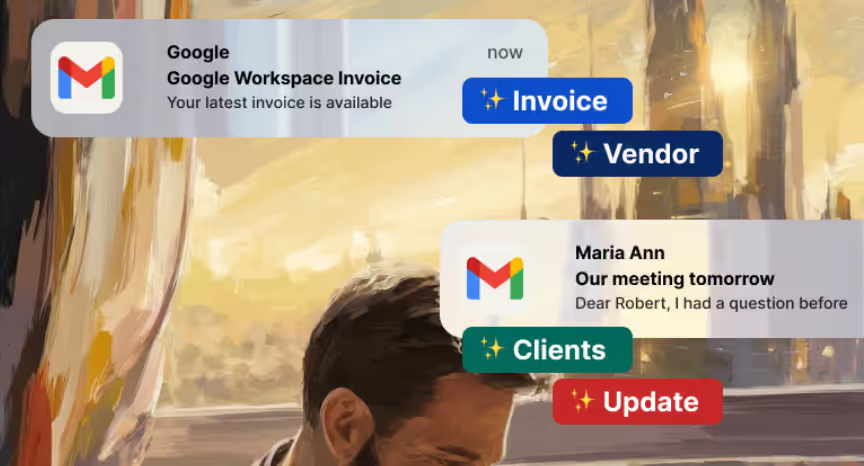
AI Dispatching Assistant
Working in tandem with the sorting assistant, this agent automates the workflow of email delegation. Once an email is categorized, the dispatching agent can automatically route it to the correct team member or shared inbox based on predefined rules.
For example, any email tagged "Technical Support" can be instantly assigned to the engineering team's queue, ensuring the right expert handles the query and speeding up resolution times.
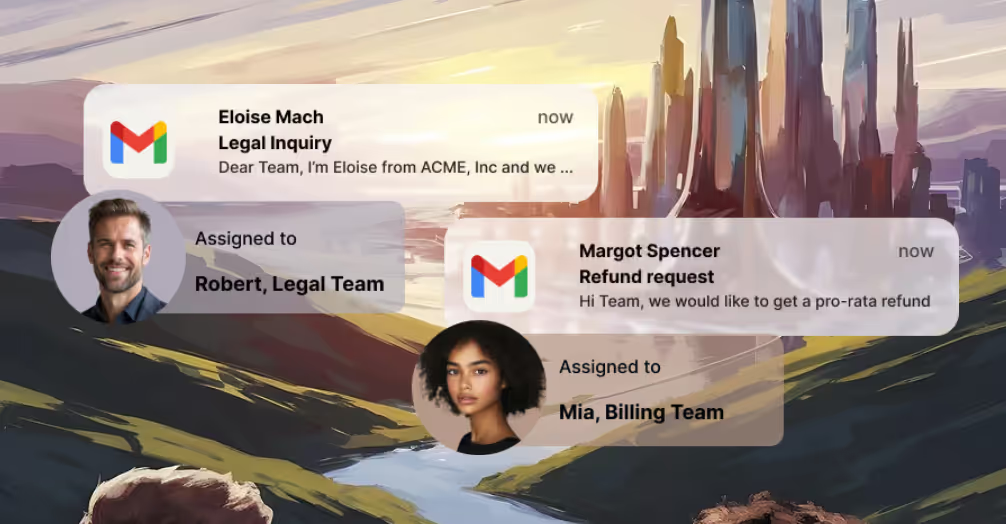
General Purpose LLMs
General-purpose Large Language Models (LLMs) like those from OpenAI and Anthropic can also be used as powerful assistants for a wide range of tasks, from writing and research to coding and data analysis.
While they may not be as deeply integrated into a specific platform as Notion AI or Gmelius, they offer a high degree of flexibility and can be a cost-effective solution for those who need a more general-purpose AI tool.
Read our in-depth analysis of ChatGPT vs Gemini vs Copilot vs Claude vs Perplexity vs Grok.
Verdict: Should You Invest in an AI Agent Solution like Notion 3.0 AI?
The decision to invest in an AI agent solution ultimately comes down to identifying the core bottleneck in your team's workflow. For teams deeply embedded in the Notion ecosystem, the 3.0 AI agents offer a powerful, integrated way to centralize knowledge and automate tasks within that single source of truth.
The ability to connect with other apps makes it a compelling contender for the role of a central work hub, provided the cost of the Business Plan aligns with your budget.
However, the right choice isn't just about finding an all-in-one platform, but about solving a specific, pressing problem. As the AI landscape evolves, it's clear that different agents are being built for different purposes. For teams whose primary challenges are knowledge management and internal project documentation, solutions like Notion 3.0 AI are at the forefront.
But if your goal is to streamline customer support, manage sales inquiries, collaborate with team mates, and reduce time spent on email, an AI agent that works inside your existing inbox, like Gmelius, offers a more direct path to solving those specific communication challenges.



.avif)
.avif)
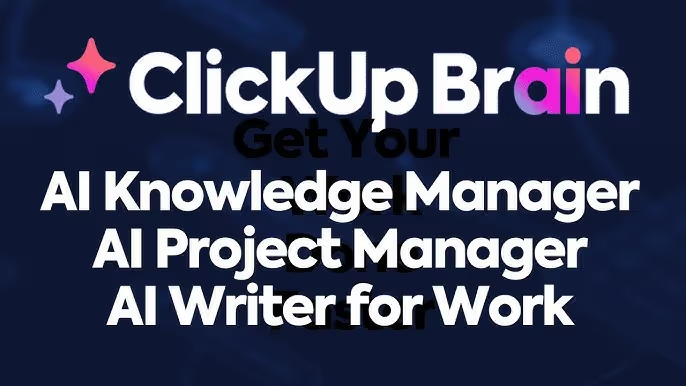

%20(1).avif)